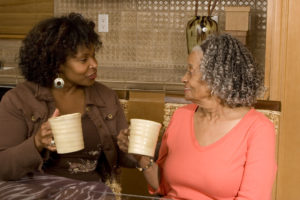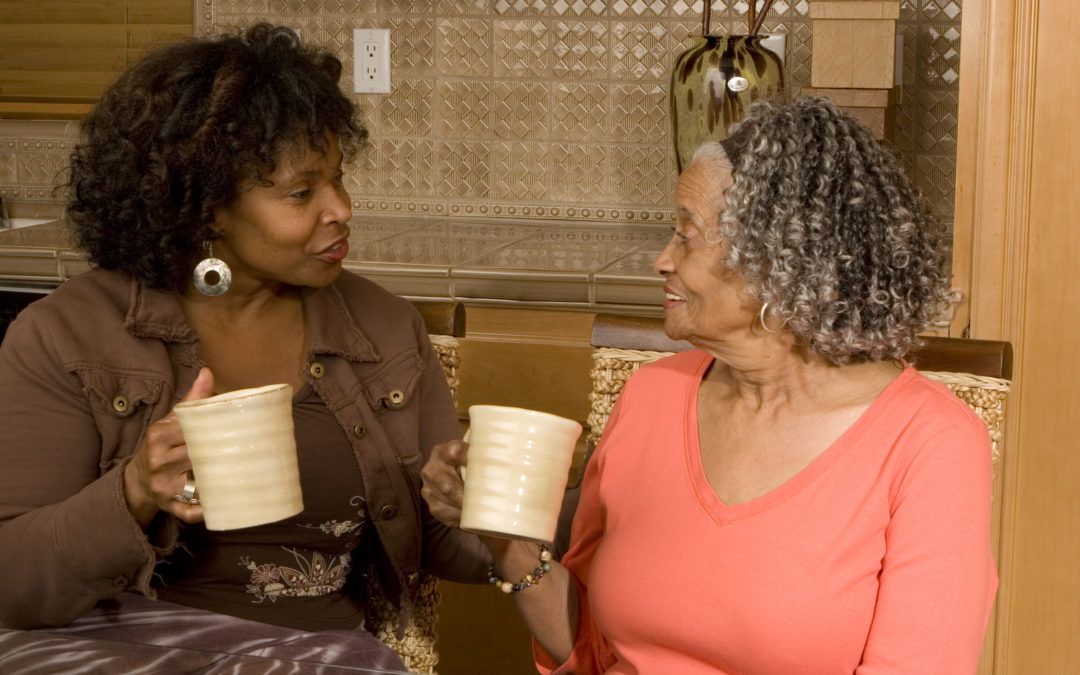
African American mother having coffee with her daughter.
Women love my work. When I talk, their eyes light up and they lean in. My real passion, my mission in life and on this planet, is women’s history: gathering, growing, saving, and sharing it.
But as women, we mostly have been raised in cultures that valued modesty and humility, and discouraged pride and self-celebration. For women.
So most women shy away from feeling “worthy” of being included in history and placing the evidence of their lives in archives.
When women’s historian Laurel Thatcher Ulrich famously wrote “Well-behaved women seldom make history,” she was actually mourning the absence of evidence that colonial women in the US left behind. I love that we now use it as a call to break out of the molds of modesty and humility in favor of action.
A traditional understanding of history as only open to the “best and brightest,” or only powerful movers and shakers, prevents us from seeing ourselves in it — and participating in it. But…
Across lines of race, ethnicity, class, age, and sexual identity, women love to hear about the work I’ve done. They nod and raise eyebrows when I share about the stories I’ve heard and saved through oral histories, the black single mom who saved everything charting her course to the presidency of her local NAACP chapter and the university that now houses her papers, or the Jewish family whose 6,000 photos document 100 years of immigration history.
By and large, citizens trained to value their own work have been men.
That seems like it’s changing because we hear all the time about glass ceilings being shattered. But it is not changing in archives.
When I speak with lawyers, crafters, female entrepreneurs, food service workers, coaches, farmers, special needs moms, office workers, or CEOs about gathering and saving their papers, one thing is consistent: their response. Without fail, women who light up and lean in STILL say about their own history “oh no, not me.”
Stay at home moms, construction workers, and office workers. But also “successful” women, powerful women, the first woman to serve in their professional position, visionaries, leaders, artists. Singular women. Heroic women.
It is heartbreaking.
But.
When I talk about family history, that resistance to stepping into “worthiness” rarely comes up.
The stakes are lower. It feels like there’s less pressure to be or find what is monumental. Women are far more willing to build a memorial to heritage. I’ll take it.
I will do family history and archives. And I’ll keep talking about women’s history and insisting that every woman has a story worth saving.
There is room for both, for all of us: professionals, stay at homes, spinsters, parents, artists, witches, and CEOs.
And yet, I know this about women’s history: It is up to us to insist on our own conclusion. Won’t you join me in this mission?
Click HERE for your free guide to What Goes in an Archive (and what doesn’t).


 I spent 18 years as “archivist and senior research scholar” at an academic science library, actively trying to add women to the historical record and looking for the women who were already included almost accidentally. I have degrees in women’s history and cultural theory — the latter means that I see the cultural value of everyday practices such as food, clothing, hobbies, and domestic arrangements. Non-famous people matter.
I spent 18 years as “archivist and senior research scholar” at an academic science library, actively trying to add women to the historical record and looking for the women who were already included almost accidentally. I have degrees in women’s history and cultural theory — the latter means that I see the cultural value of everyday practices such as food, clothing, hobbies, and domestic arrangements. Non-famous people matter.